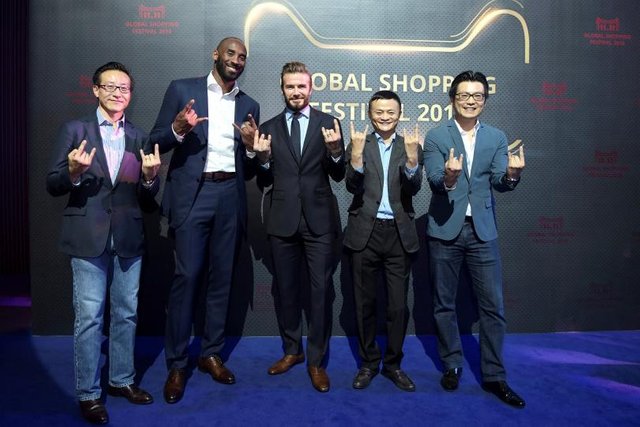Alibaba sets ‘Singles’ Day’ record with $32B of sales in one day
Nov. 11, or Singles Day in China, was named because of the way 11/11 looks like a Chinese expression for those not in relationships.
Alibaba Group Holding Ltd.’s Singles’ Day shopping bonanza generated a record 168.2-billion yuan ($32 billion) in sales, as the company’s investment overseas and effort to link traditional retailers with the internet paid off.
The annual frenzy posted a 39-per-cent increase in sales, exceeding Citigroup Inc. estimates and defying concerns of an economic slowdown. The event helped at least 82 brands top 100-million yuan in sales — with Nike Inc., Xiaomi Corp. and Uniqlo Co. coming out as some of the biggest winners.
To pump sales, the Chinese company also hosted a star-studded gala with film star Nicole Kidman and American rapper Pharrell Williams. Chief executive Daniel Zhang said the company wants to make the event more global, and is planning to take its gala overseas soon, without giving a time frame. This year, shoppers from at least 225 countries and regions swarmed the e-commerce giant to scoop up discounted lobster, iPhones and refrigerators.
“We want to make Singles’ Day a more global event,” said Zhang during an interview in Shanghai. “We could take the gala overseas very soon.”
About 90 per cent of transactions were done via mobile. At its peak, the company’s processors handled 256,000 transactions per second.
Citigroup Inc. has predicted transactions will rise by more than 30 per cent to 158-billion yuan this year. While that’s only half the growth rate last year, the event still dwarfs others such as Black Friday and Cyber Monday. Billionaire founder Jack Ma is using it as a testing ground for his plans to revamp China’s $4-trillion (U.S.) traditional retail sector with technology, an experiment that could help the behemoth gain an edge in China’s saturated market.
“The work that’s been done in the integration of offline and online, not just in terms of the technology integration, but the data and efficiencies for brands and the consumer through personalization has been enormous,” Alibaba president Mike Evans said in an interview on Bloomberg TV. “We see the impact of it in our day-to-day business.”
The date of Nov. 11 emerged as a counter-cultural antidote to the sentimentality of Valentine’s Day. It takes its name from the way the day is written numerically as 11/11, which resembles “bare branches,” a local expression for the unattached.
Now, it’s become an excuse for people to shop and binge on entertainment shows. Hangzhou-based Alibaba is using the occasion to test the limits of its cloud computing, delivery and payments units — businesses that could benefit from roping in traditional retailers as customers.
To that end, Alibaba teams fanned out across the nation before the event to help outlets — some 600,000 mom-and-pop convenient stores and about 1,000 brands — upgrade their computer systems. Those retailers, many in prime city locations, will become delivery and storage centres.
To connect a tenth of China’s six million convenience stores to the internet, Alibaba uses an app called Ling Shou Tong, meaning “connect retail.” Convenience stores are given suggestions on what to procure and how to display merchandise. The goods are shipped from dedicated Alibaba warehouses, obviating middlemen. In theory, that improves their profit.
The company is also converting 100,000 retail outlets into so-called smart stores. If one shop runs short of certain inventory, customers can track availability at other locations. They can also get goods delivered to their home.
It’s early days in Alibaba’s grand retail experiment, but if it works, it could deepen a lead over Jeff Bezos’ Amazon.com Inc. in the fragmented world of physical retailing. Ma’s company spent billions buying into grocers, shopping malls and even department stores years before Amazon announced its $13.7-billion acquisition of Whole Foods Market Inc.
“On the back of 11-11, we will probably have to distribute north of 700 million packages,” Evans said. “That is a massive, massive number of packages that requires a robust logistics network both in China and outside of China, and we will continue to invest in that business, and by moving to a controlling position, we will be able to ensure the right degree of quality.”

Congratulations @taniaghosh! You have completed some achievement on Steemit and have been rewarded with new badge(s) :
Click on any badge to view your own Board of Honor on SteemitBoard.
For more information about SteemitBoard, click here
If you no longer want to receive notifications, reply to this comment with the word
STOPHi! Your post has been selected by @NanoCheeZe to be upvoted by @XTDevelopment ... Don't forget to check us out - NanoCheeZe.com
Hi! I am a robot. I just upvoted you! I found similar content that readers might be interested in:
https://www.thestar.com/business/2017/11/11/alibaba-sets-singles-day-sales-record-with-32b-in-sales.html